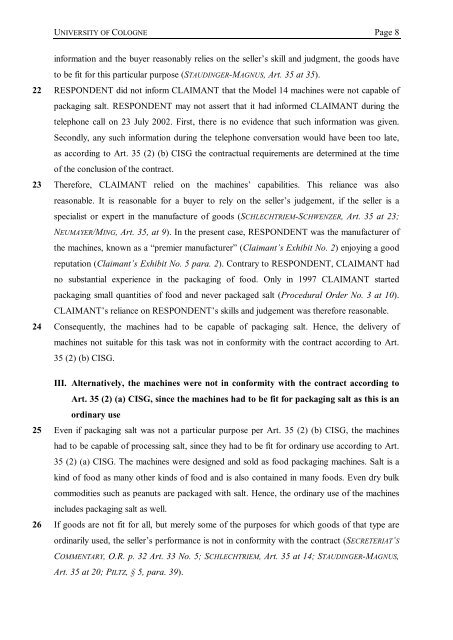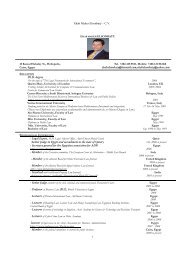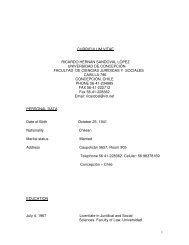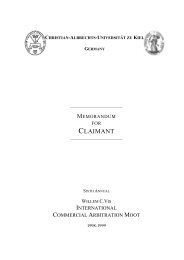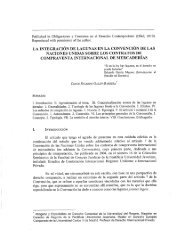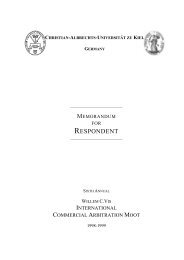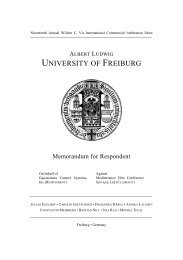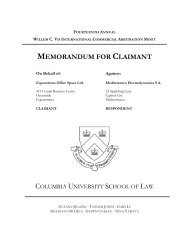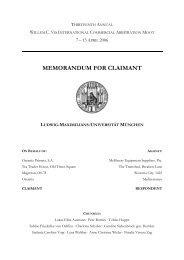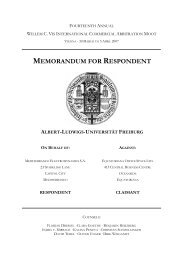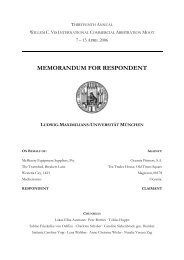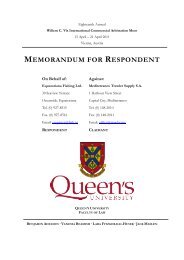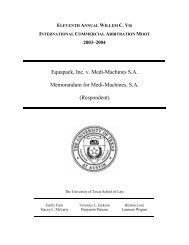Claimant's brief (Cologne) - Pace University
Claimant's brief (Cologne) - Pace University
Claimant's brief (Cologne) - Pace University
Create successful ePaper yourself
Turn your PDF publications into a flip-book with our unique Google optimized e-Paper software.
UNIVERSITY OF COLOGNE Page 8<br />
information and the buyer reasonably relies on the seller’s skill and judgment, the goods have<br />
to be fit for this particular purpose (STAUDINGER-MAGNUS, Art. 35 at 35).<br />
22 RESPONDENT did not inform CLAIMANT that the Model 14 machines were not capable of<br />
packaging salt. RESPONDENT may not assert that it had informed CLAIMANT during the<br />
telephone call on 23 July 2002. First, there is no evidence that such information was given.<br />
Secondly, any such information during the telephone conversation would have been too late,<br />
as according to Art. 35 (2) (b) CISG the contractual requirements are determined at the time<br />
of the conclusion of the contract.<br />
23 Therefore, CLAIMANT relied on the machines’ capabilities. This reliance was also<br />
reasonable. It is reasonable for a buyer to rely on the seller’s judgement, if the seller is a<br />
specialist or expert in the manufacture of goods (SCHLECHTRIEM-SCHWENZER, Art. 35 at 23;<br />
NEUMAYER/MING, Art. 35, at 9). In the present case, RESPONDENT was the manufacturer of<br />
the machines, known as a “premier manufacturer” (Claimant’s Exhibit No. 2) enjoying a good<br />
reputation (Claimant’s Exhibit No. 5 para. 2). Contrary to RESPONDENT, CLAIMANT had<br />
no substantial experience in the packaging of food. Only in 1997 CLAIMANT started<br />
packaging small quantities of food and never packaged salt (Procedural Order No. 3 at 10).<br />
CLAIMANT’s reliance on RESPONDENT’s skills and judgement was therefore reasonable.<br />
24 Consequently, the machines had to be capable of packaging salt. Hence, the delivery of<br />
machines not suitable for this task was not in conformity with the contract according to Art.<br />
35 (2) (b) CISG.<br />
III. Alternatively, the machines were not in conformity with the contract according to<br />
Art. 35 (2) (a) CISG, since the machines had to be fit for packaging salt as this is an<br />
ordinary use<br />
25 Even if packaging salt was not a particular purpose per Art. 35 (2) (b) CISG, the machines<br />
had to be capable of processing salt, since they had to be fit for ordinary use according to Art.<br />
35 (2) (a) CISG. The machines were designed and sold as food packaging machines. Salt is a<br />
kind of food as many other kinds of food and is also contained in many foods. Even dry bulk<br />
commodities such as peanuts are packaged with salt. Hence, the ordinary use of the machines<br />
includes packaging salt as well.<br />
26 If goods are not fit for all, but merely some of the purposes for which goods of that type are<br />
ordinarily used, the seller’s performance is not in conformity with the contract (SECRETERIAT’S<br />
COMMENTARY, O.R. p. 32 Art. 33 No. 5; SCHLECHTRIEM, Art. 35 at 14; STAUDINGER-MAGNUS,<br />
Art. 35 at 20; PILTZ, § 5, para. 39).


